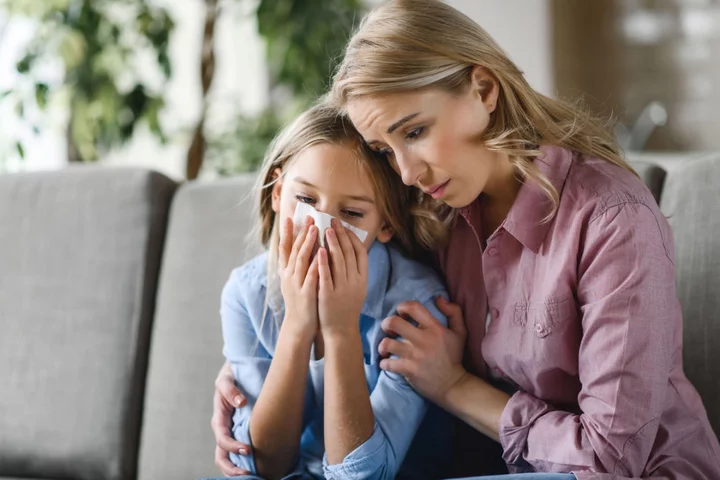
‘Boy moms’ receive backlash for teaching sons how to cook - but for the wrong reason
Many people are calling out mothers of sons - also known as “boy moms” - for the reason why they’re teaching their sons how to cook, as some people call it a “red flag”. The TikTok trend first began when user Laura Elizabeth Graham shared a video of herself cooking in the kitchen with her young son, as she wrote over the clip: “Making sure my son can cook so he’s not impressed by your daughter’s [Stouffer’s] lasagna.” She continued to write in the video’s caption that her son would need a “home-cooked meal” from his future wife. Meanwhile, fellow “boy moms” also hopped on the trend, as one shared a similar video how she was teaching her son cooking skills so “he’s not impressed by your frozen pizza daughter”. The videos have since sparked a debate, as many users replied that they were teaching their sons to cook “because it’s a necessary life skill for independence.” “Teaching my son to cook because it’s a basic necessity,” one person commented under Graham’s video. Another person proclaimed they were “team daughter-in-law,” while one viewer added that the trend was “screaming red flags”. In response to the TikTok trend, some mothers took the opportunity to point out that showing young boys how to cook - just so that he’s not “impressed” by someone else’s cuisine - only teaches him to expect a higher level of household labour from his future partner. In fact, TikTok user Payal Desai posted a series of videos showing the ways in which she was teaching her sons how to take care of themselves - emotionally and physically - as they grow older. In one video, Desai showed her sons how to clean the dishes and explained why she does it: “So your daughter doesn’t have to deal with a man who was catered to his whole life.” @lauraelizabethgraham He’s gonna need a home cooked meal Felicia ? #boymom #boymomlife #boymomsoftiktok #mamasboy #mommasboy #mamasboys #relatablemom #motherinlaw #motherinlawproblems #momsoftiktok IB: @brontevictoria.capowski ♬ original sound - Laura Elizabeth Graham Many mothers of young boys also joined in, showing the ways in which they were empowering their sons to be more self-sufficient and responsible. Meanwhile, psychologist and mother Amber Wardell reacted to the TikTok trend, saying in a video: “I’m teaching my son to cook so that he will show up for his future wife as though she’s his partner and not his servant.” The ongoing trend to categorise parents as a “boy mom” or “girl dad” reportedly perpetuates gender stereotypes. “The gendering process then continues through quite literally every aspect of that child’s life: the pink or blue newborn hospital beanie, the princess or football player clothing gifted at the baby shower, the jungle or fairyland nursery room decor, and of course, the toy trucks or baby dolls,” Dr Jessica N Pabón-Colón - an associate professor of women’s, gender, and sexuality studies at SUNY New Paltz - explained to Refinery29 in 2021. @payalforstyle No dust here. #dustyson #dustydaughter #trend #boymom ♬ original sound - Bryan Pabón-Colón emphasised that juxtaposing opposite genders, in hashtags like #BoyMom, also reinforces supposed gender differences. Speaking to the outlet, she explained that both the #GirlDad and #BoyMom trend “announces the ‘feminine’ mother’s ability to parent a child whose ‘masculine’ gender is different from hers,” and ultimately suggests that parents of the opposite gender have to try harder to relate to their girls and boys. @sensible_amber This is how we create snobby, entitled men who treat their wives like the help and constantly compare them to mommy dearest. Let’s teach our boys to be self-sufficient, nurturing, compassionate, and supportive. Let’s teach them that their wives do not exist to be their mommies. Most importantly, let’s teach our sons that it is HEALTHY and NORMAL for them to one day leave us and become more attached to their wives than they are to us, and that this is what we WANT for them. Otherwise, we’ll all end up with our boys living with us forever — not because they love us but because no women will have them. They’ll be divorced, lonely and miserable, and we’ll still be cooking their meals. Is this really what we want for our sons? #motherhood #momlife #motherhoodunplugged #motherhoodunited #parenting #boymom #biymomculture #toxicboymomculture ♬ original sound - Amber Although seemingly innocuous, she suggested that this mentality does more harm than good. While the hashtags themselves aren’t harmful, Pabón-Colón emphasised that their stereotypes are limiting. She argued that “the label ‘boy’ cannot possibly contain [a child’s] personality traits,” and that there’s more to any one person than their sex or gender. “Having a vulva does not explain a child’s desire to have a tea party with their dad any more than having a penis explains a child’s desire to climb a tree with their mom,” Pabón-Colón said. The Independent has contacted Laura Elizabeth Graham for comment. Read More Homeowner sparks criticism after telling contractor not to use her bathroom Bride tries on mother’s wedding dress 30 years after parents’ wedding Mom documents at-home abortion to destigmatise abortion pills Schoolboy almost dies from swallowing magnets for TikTok challenge Woman shares honest review of New York City apartment TikTok mom slammed after making 5-year-old son run in 104 degree heat
1970-01-01 08:00

Pilot killed in US military jet crash in San Diego
The Marine Corps has launched an investigation into the crash of the F/A-18 Hornet fighter plane.
1970-01-01 08:00

Tibet profile
Provides an overview of Tibet, including key dates and facts about this autonomous region of China.
1970-01-01 08:00

Xinjiang profile
Provides an overview of Xinjiang, including key dates and facts about this autonomous region of China.
1970-01-01 08:00

US military jet crashes near Marine Corps Air Station Miramar in San Diego
A US military F/A-18 Hornet fighter jet crashed late Thursday near San Diego, according to a statement from Marine Corps Air Station Miramar.
1970-01-01 08:00

Chris Pratt’s daughters give him a glittery makeover
Chris Pratt has shown off his sparkly new look after his daughters gave him a makeover. The Guardians of the Galaxy star, 44, shares his daughters Eloise Christina, 15 months, and Lyla Maria, three, with his wife Kathrine Schwarzenegger. He also shares his 11-year-old son, Jack, with ex-wife Anna Farris, 46. In an amusing Instagram caption, Pratt wrote: “All I have to say... Jack would never do this to me.” Pratt gave fans a glimpse of two different looks. The first one showed his forehead bedazzled with teal, purple, and silver gems. He had pearl-like gems dotting his face, as well as a teal manicure, in the other. TheTomorrow War actor opened up on Late Night with Seth Meyers about his experience going from raising one son to two daughters. Pratt noted that his daughters’ penchant for all things glitter is one of many differences that he loves and appreciates. “I love it. It’s fantastic,” he gushed to host Seth Meyers. “You know, you hear that maybe the experience is different and it really is, in my experience." “My daughter Lyla is so girly. I picked her up yesterday and she said, ‘Oh Daddy, that’s a cute outfit. Look, you have little cute pockets,” Pratt added, laughing: “That’s not something Jack ever said to me.” While Eloise and Lyla may be mini fashionistas, Jack has taken a liking to America’s favorite pastime: baseball. The Parks and Recreation alum took his son to watch a Los Angeles Dodgers baseball game in late July and posted pictures of the fun father-son day on Instagram. In the photos, Pratt and his son posed with a jersey that had their last names printed on the back. “What a day! Jack and I got to hit the mound together, eat our bodyweight in Dodger Dogs and delivered the game opening announcement!” the actor captioned his post. He also mentioned his gratitude to the baseball team for hosting the fun outing: “Thank you @claytonkershaw for asking me to throw yesterday’s pitch for faith and family day, what an honour! Let’s go Dodgers!” Watching his father play baseball isn’t the only time that Jack has supported his dad. Pratt previously said that his son was “freaked out” that his dad was voicing Mario in The Super Mario Bros Movie, telling People: “He saw it already and he’s thrilled. He loves it. He took all his friends and he really freaked out.” The actor also noted that although his daughters were “a little too young” to watch the movie, he hoped that when they eventually see it “they’ll think their dad is cool”. Read More Maria Shriver reveals how she avoids conflict as a mother-in-law: ‘I zip my mouth’ Chris Pratt says every dad ‘secretly fantasizes about what they’d do if someone ever f***** with their kids’ This is how stress affects different parts of the body 4 hacks to get teens off the sofa and get active – as study warns of heart damage How to protect your kids and yourself from back-to-school colds
1970-01-01 08:00

This is how stress affects different parts of the body
The increased focus on mental health in the last few years has seen more and more people turning to things like mindfulness, meditation and talking therapies to cope with stress. While these techniques can be very effective, it’s important to remember that stress isn’t ‘all in your head’ – it can have a serious physical impact as well. “Stress is how you feel and respond when life puts you under a lot of pressure,” says Dr Luke Powles, associate clinical director at Bupa Health Clinics. “A certain amount of stress can be positive, as it can help you prepare for challenges and respond to them,” Powles adds. “But too much stress, especially over a long period of time, can cause both mental and physical problems.” That’s why it’s vital to look at the sources of stress in your life and be aware of both the short and long-term symptoms. Here’s how stress can affect different parts of the body… Heart and lungs A sudden surge of stress can make you feel like you’ve just run up several flights of stairs. “Immediately, you’re going to get an increase in your heart rate, with that almost panic attack or anxiety-like feeling,” says Dr Alka Patel, aka the Health Hacktivation Doctor. “Your breathing rate is going to speed up as well, because you’re trying to oxygenate your blood.” That’s also why you might get sweaty palms or pits: “You get vasodilatation of your blood vessels – you’re basically trying to increase blood flow to your body, so sweating is a very immediate phenomenon for most people.” Stressful situations can raise your blood pressure temporarily too, Powell says: “If you’re stressed over a long time, you could possibly develop long-term high blood pressure.” The link between stress and heart disease is mitigated by other factors. “Stress may not directly cause coronary heart disease, such as a heart attack or stroke and cholesterol,” says Powell. “But if you smoke, drink, or eat more to cope with stress, you increase your risk of these. Stress may also increase the risk of type 2 diabetes.” Doctors also warn about heart rate variability (HRV), meaning the variation in the pauses between heartbeats. “You want a high HRV because you want to be adaptable,” Patel explains. “When you’re under chronic stress your HRV starts to drop, and that tells you that you’re not resilient in the face of stress.” Stomach and gut Feeling too anxious to eat? Or craving carbs when you’re under pressure? “You’re releasing this surge of cortisol, the stress hormone, very quickly, which is then trying to get as much sugar and fuel on board,” Patel explains. “A lot of people will then either notice the hunger response: ‘I’ve got to eat lunch to manage my stress’. Or you notice the dip, which is: ‘I don’t want to eat, I can’t eat anything else’.” You might experience digestive issues as well, she continues: “With an immediate stress reaction, everything else in your body has to stop. This means you can start to get those symptoms of diarrhoea, upset stomach, that kind of thing, because all of those digestive processes have to have to halt in order to manage your stress.” There are also some links between chronic stress and certain illnesses, including digestive complaints. “If you have a pre-existing health condition, stress could make it worse, or flare up,” says Powell. “Examples of conditions that can be aggravated by stress include irritable bowel syndrome, eczema, asthma and psoriasis.” Muscles A surge of stress can cause muscle spasms called fasciculation and tension in the cervical muscles of the neck, which might lead to a headache. “People don’t necessarily associate headaches with muscles, but you can get spasms in your upper neck muscles and shoulders,” Patel says. “You feel the tension in the muscles going over your scalp – and that’s why we call these tension headaches.” Teeth and mouth Stress can also harm your oral health, which should be dealt with by a dentist. “Teeth grinding (bruxism) is often linked to stress, but lots of people aren’t aware they have the condition because it happens in their sleep,” says Powell. “Symptoms include headaches, earache, stiffness and pain in the jaw or mouth; teeth which are breaking or look worn down; and facial swelling.” Inflammageing A hot topic among longevity specialists in recent years, ‘inflammageing’ means chronic inflammation that has a damaging effect and is caused by a variety of diet and lifestyle factors. “Stress accelerates ageing, and then there’s a whole cascade of stuff that goes on as a result of that,” says Patel. “[It affects] your immune response, the communication between your cells, muscle function and your bones.”
1970-01-01 08:00

Trump's Georgia mugshot quickly becomes a campaign symbol
Within minutes of it being released, it appeared on his website along with a call for campaign donations.
1970-01-01 08:00

'I am sincerely thankful for the stability of your steadfast support': Miley Cyrus drops reflective ballad, Used To Be Young, dedicates it to her loyal fanbase
Miley Cyrus gets misty-eyed on her reflective rock-pop ballad, 'Used To Be Young'.
1970-01-01 08:00

How to protect your kids and yourself from back-to-school colds
While your child may be excited about returning to school this September, there’s also a little anxiety about the one thing that can put a spanner in the works: a cold. As Dr Dave Nichols, of MyHealthChecked, an at-home wellness testing company, puts it: “The return to school following the summer holidays often coincides with a rise in a number of respiratory illnesses, including the common cold.” Common symptoms include a cough, sore throat, nasal irritation, nasal discharge (rhinorrhoea), a fever or generalised malaise, explains Nichols. “While the common cold can affect all population groups, the National Institute for Health and Care Excellence report this to be far higher amongst children, who experience an average of five to eight colds per year.” Nichols continues: “Adults who have regular contact with children are also seen to have colds more frequently.” He says children are especially important in the transmission, acting as reservoirs for the infection as they have fewer antibodies and a more immature immune system, making them more susceptible to the common cold. “Direct contact with the skin or hand contact with an infected object are key ways the virus is transmitted,” notes Nichols. “Which explains why numbers seen amongst children are higher, as they are more likely to have close contact with each other in nursery and school.” While there is no cure for the common cold, he says prevention remains crucial in order to protect ourselves from illness. Here are some top tips to reduce the chances of catching a cold… Adopt good hygiene measures Basic good hygiene measures are an important way of reducing the transmission of viruses, says Nichols. Wash hands frequently with warm soap and water if you (or the kids) have symptoms, or have come into close contact with someone who has symptoms. He says to avoid sharing items within households, such as towels, can also help. Get into a physical exercise routine Ensuring regular physical exercise is important because it has been shown to reduce the chances of people developing viral illnesses such as the common cold, advises Nichols. “Exercise plays an important role in boosting immunity by increasing the circulation of some important immune cells, which fight against infection,” says Nichols. “It also plays a key role in helping to reduce stress and the release of stress-related hormones within the body, which has an important impact.” Eat healthy foods to maximise your wellbeing “Eating well will help support a good functioning immune system,” says Dr Emeka Okorocha, medical doctor and TV personality. “The body needs a range of nutrients and vitamins to stay strong and healthy, and prevent the development of disease.” He highlights the following vitamins… “Vitamin A, which is converted from beta carotene found in vegetables such as sweet potatoes and beetroots, is very good for helping support the mucosal lining in your nose and lungs – and helps defend against infection. “Vitamin C has always been considered a good preventative vitamin from catching colds, this can be found naturally in fruits like strawberries, blueberries, blackberries and raspberries – and in leafy vegetables like spinach as well as broccoli, peppers and peas. “Vitamin D that many of us get from natural sunlight is also ideal for overall health – and studies have shown that people lacking in vitamin D are more likely to succumb to infection.” In winter months, when there are lower levels of natural sunlight, he says you can obtain vitamin D from foods such as salmon, mackerel, eggs, and mushrooms. Berries are very beneficial Okorocha continues: “I love fresh berries – strawberries, raspberries and blueberries, for example, are high in antioxidants and contain lots of vitamin C, which helps our bodies to produce antibodies that keep us from getting sick. “Berries are also high in flavonoids which help protect cells in our immune system by promoting activation and secretory processes within cells.” He says studies have indicated that regularly eating fruits such as blueberries may decrease your likelihood of catching a cold. Get adequate rest and sleep Ensuring you’re getting adequate amounts of rest and sleep is crucial in helping to reduce your risk of becoming unwell, urges Nichols. “A healthy adult needs between seven to nine hours of sleep per night, with children requiring longer,” says Nichols. “Sleep quality has been shown to be an important predictor of immunity, with those regularly sleeping under the recommended amounts more likely to develop a cold. “Improving your sleeping pattern is therefore an important way to reduce the chances of becoming unwell.” Read More Former royal chef explains why Prince William and Kate’s children don’t eat with them ‘You think it’s going to be a money making machine’: How modern life killed the hobby People defend bride after father-in-law explains why he left wedding early 4 hacks to get teens off the sofa and get active – as study warns of heart damage Elle King opens up about her ‘deep depression’ amid two-year postpartum journey BBC Radio 2’s Tony Blackburn reveals he had sepsis and pneumonia in health update
1970-01-01 08:00

Canada considers foreign student cap over housing crisis
The country is looking at ways tackle the housing affordability crisis, including capping student visas.
1970-01-01 08:00

Buckle up because Selena Gomez, Miley Cyrus and Ariana Grande are all releasing new music on the same day
Buckle up -- it's a big week for pop music, with artists such as Selena Gomez, Miley Cyrus and Ariana Grande among others all set to release new music starting Thursday night.
1970-01-01 08:00
